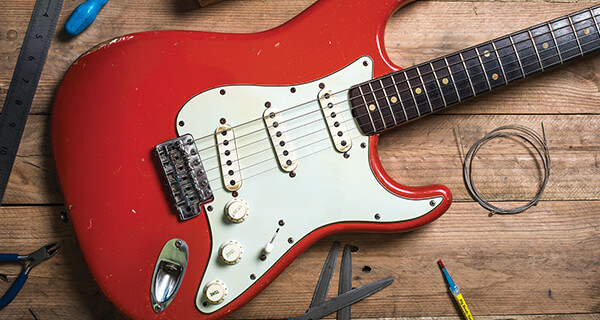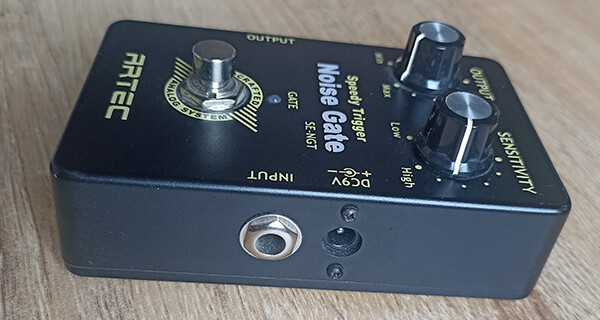Guitar Hum Goes Away When I Touch Metal [Reason & Fix]
The world of music is a realm where emotions, creativity, and technical precision merge to create masterful melodies. Yet, even the most seasoned guitar players have encountered a perplexing issue: the enigmatic phenomenon where guitar hum mysteriously disappears when the player touches a metal component of their instrument.

This occurrence, often attributed to grounding and interference, has baffled novices and experts alike. In this comprehensive guideline, we will delve into the reasons behind this phenomenon, explore the science that governs it, and provide effective solutions to eliminate guitar hum once and for all.
# Table of Contents =>
- 1 Effective Solutions to Guitar Hum Goes Away When I Touch Metal:
- 1.1 a) Upgrading Shielding and Wiring:
- 1.2 b) Proper Grounding Techniques:
- 1.3 c) Addressing Pickup Issues:
- 1.4 d) Using Noise Gate Pedals:
- 1.5 e) Environmental Considerations:
- 1.6 Conclusion:
- 1.7 FAQs –
- 1.7.1 Q. Can poor-quality cables contribute to this hum?
- 1.7.2 Q. Are there any ways to prevent or minimize guitar hum?
- 1.7.3 Q. Can changing the pickup type help with guitar hum?
- 1.7.4 Q. Are there any other environmental factors that contribute to guitar hum?
- 1.7.5 Q. Can using a noise gate pedal completely eliminate guitar hum?
The Science Behind Guitar Hum:
To understand why touching metal components on a guitar eliminates hum. It’s crucial to comprehend the principles of electromagnetic interference and grounding. Guitars are susceptible to electromagnetic interference from various sources, including fluorescent lights, electronic devices, and power sources. This interference can result in the dreaded hum that disrupts the pure sound of the instrument.
When a player touches a metal part of the guitar, they essentially create a pathway for this unwanted electrical interference to escape, leading to a reduction in hum. This action completes an electrical circuit, allowing the excess noise to dissipate harmlessly.
The Role of Grounding:
Grounding is a fundamental concept in electronics and plays a pivotal role in mitigating guitar hum. In a properly grounded setup, excess electrical energy is directed away from the audio signal path. It is reducing the likelihood of interference. However, when a guitar’s internal components or wiring are not adequately grounded, electromagnetic noise can infiltrate the signal chain, resulting in hum.
The phenomenon of hum disappearing when a guitarist touches metal is often attributed to their body acting as a conduit for the unwanted electrical energy to discharge. Thus, proper grounding techniques are essential to maintain a clean audio signal.
Identifying the Problems:
Various factors can contribute to the appearance of guitar hum. Poor quality cables, improperly shielded pickups, and inadequate grounding are common culprits. The proximity of electronic devices emitting electromagnetic radiation can exacerbate the problem.
Identifying the sources of interference is the first step in effectively addressing the issue. Players should examine their setup and environment to identify potential sources of hum, both within and outside the instrument.
Effective Solutions to Guitar Hum Goes Away When I Touch Metal:
a) Upgrading Shielding and Wiring:

Swapping out stock wiring and upgrading to shielded cables can significantly reduce hum by blocking external electromagnetic interference. Shielding the guitar’s cavities and control cavities can also prevent unwanted noise from infiltrating the signal path.
b) Proper Grounding Techniques:

Ensuring that the guitar’s internal components are adequately grounded is crucial. This involves connecting various metal components (such as the bridge, pickups, and output jack) to a common ground point. Proper grounding can be achieved through soldering, grounding plates, and conductive paint.
c) Addressing Pickup Issues:
Pickup design and placement can greatly influence the susceptibility of a guitar to hum. Humbucker pickups, known for their noise-cancelling properties, are often preferred by players seeking to minimize interference. Adjusting the pickup height and orientation can also impact the level of hum.
d) Using Noise Gate Pedals:

Noise gate pedals are devices that can be inserted into the signal chain to suppress unwanted noise when the player is not actively playing. These pedals detect when the signal drops below a certain threshold and cut off the audio to eliminate hum and hiss.
e) Environmental Considerations:
Creating a controlled environment by minimizing the proximity of electronic devices and fluorescent lights during recording or performance can go a long way in reducing interference.
Conclusion:
In the realm of music, where every note is meant to resonate with clarity and emotion, the battle against guitar hum is a quest for sonic purity. The phenomenon of hum disappearing when a guitarist touches metal is a testament to the interconnections of science and art.
By understanding the principles of electromagnetic interference, grounding, and proper signal chain management. Musicians can unlock the secrets to a noise-free performance. As technology and innovation continue to evolve, so too will our ability to conquer the challenges that impede musical expression. This is allowing us to revel in the harmony of unadulterated sound.
FAQs –
Q. Can poor-quality cables contribute to this hum?
A: Yes, poor-quality cables can contribute to guitar hum. Low-quality cables might not provide proper shielding, making them susceptible to electromagnetic interference. Upgrading to shielded cables can significantly reduce hum by blocking external interference.
Q. Are there any ways to prevent or minimize guitar hum?
A: Absolutely. There are several steps you can take to prevent or minimize guitar hum. These include upgrading shielding and wiring, using noise-cancelling pickups (like humbuckers), employing noise gate pedals, ensuring proper grounding techniques, and creating a controlled environment by minimizing the proximity of electronic devices during recording or performance.
Q. Can changing the pickup type help with guitar hum?
A: Yes, changing the pickup type can help reduce guitar hum. Humbucker pickups are known for their noise-cancelling properties due to their design, which employs two coils that cancel out electromagnetic interference. Single-coil pickups are more susceptible to hum due to their construction, but adjusting their height and orientation can also help mitigate the issue.
Q. Are there any other environmental factors that contribute to guitar hum?
A: Yes, environmental factors can contribute to guitar hum. The proximity of electronic devices emitting electromagnetic radiation, as well as fluorescent lights, can exacerbate the problem. Minimizing the presence of these sources during recording or performance can help reduce interference.
Q. Can using a noise gate pedal completely eliminate guitar hum?
A: While a noise gate pedal can help reduce unwanted noise, it might not completely eliminate guitar hum, especially if the hum is originating from external sources. Noise gate pedals work by suppressing noise when the signal drops below a certain threshold.
They are effective for eliminating hiss and background noise when you’re not actively playing, but they might not address all forms of interference.
Last Updated on September 14, 2023 by Perry Garner
Related Posts

Bass Buzzing Sound [Reason & Effective Way to Fix]

Tube Amp Hum Not Affected by Volume [Reason & Fix]

Guitar Amp Turns On But No Sound From Speakers [Reason & Fix]
About Author
Perry Garner
I am an Amateur Guitarist, Musician, Audio professional, and Founder of Musician on a Mission. Follow Me on Twitter=>